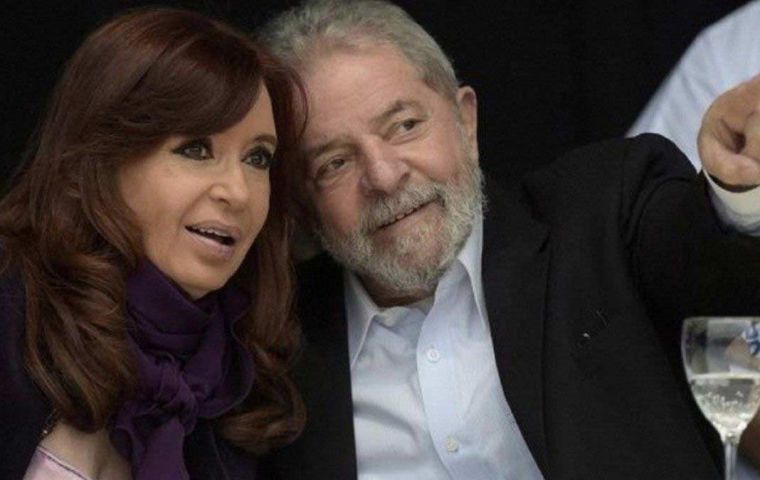MercoPress. South Atlantic News Agency
CFK pushes for universal income for Argentines
 CFK is counting on Lula's return to power to develop her strategies
CFK is counting on Lula's return to power to develop her strategies Argentine Vice President Cristina Fernández de Kirchner (CFK) has been reportedly pressing Economy Minister Silvina Batakis to move forward with a proposal to create the so-called Basic Universal Wage (BUW), as a way out of the current scheme of handouts in the form of endless unemployment subsidies.
According to reports, there have been negotiations in this regard among Senators who in one way or another respond to CFK.
The bill has been known to spark bitter disputes among lawmakers from the ruling Frente de Todos (FdT), while word at Casa Rosada has it that the government will not push the BUW through Congress for now, but it has not been ruled out altogether.
Buenos Aires Province Minister of Community Development Andrés Larroque, a hard-line Kirchnerite and Secretary-General of the La Cámpora youth movement founded by Deputy Máximo Kirchner, has warned that the Alberto Fernández government has two months to come up with the BUW either through a Law of Congress or via a decree, or face “serious and deep consequences.”
Earlier this year, Larroque was one of the strongest voices calling for the dismissal of then-Economy Minister Martín Guzmán.
However, Presidential Spokeswoman Gabriela Cerruti insisted that “for the time being we are not going to move forward with the Universal Basic Wage, the accounts do not add up.”
Security Minister Aníbal Fernández also said that “the things that can be done are done,” meaning the Treasury has no way to finance the BUW for now.
The Universal Basic Wage bill submitted to the Lower House by Deputies Itaí Hagman, Fernando Fagioli, and Natalia Zaracho mentions a monthly payment of AR$ 14,400 (around US$ 50 at the unofficial exchange rate) to each adult.
To be eligible for the SBU, the bill states people must be aged between 18 and 65 and Argentine citizens by birth or through nationalization with a permanent residence of no less than 2 years, with no other social benefit.
Meanwhile, economists at the Kirchnerite think tank Instituto Patria are studying the possibility of a new one-on-one convertibility between the Argentine peso and the Brazilian real, subject to former President Luiz Inácio Lula Da Silva returning to power as all polls forecast.
“The bimonetary economy unites all the crises in Argentina: the shortage of dollars, the exchange run, devaluations, and inflation,” said CFK in one of her last public appearances. Hence the idea to decouple Argentina's economy from the US dollar.
If Lula wins October the presidential elections in Brazil, a new geopolitical scenario would boost CFK's chances to return to Casa Rosada.
Lula has delivered various speeches and conferences at the headquarters of the Instituto Patria.
Last week, Productive Development Minister Daniel Scioli discussed with Brazil's Economy Minister Paulo Guedes the possibility of bilateral trade leaving aside the US dollar, of which there are not very many left in Argentina's coffers.




Top Comments
Disclaimer & comment rules-

-

-

Read all commentsAll of S. America already has a common currency, it’s called the US Dollar.
Jul 18th, 2022 - 03:04 pm +1Is she paying for it? She certainly has obtained enough cash to fund it...
Jul 18th, 2022 - 08:18 am 0Trading in local currency would be very good for our economies. I will say more: it is past time for Mercosul and for all of South America to have a single currency.
Jul 18th, 2022 - 02:23 pm 0Commenting for this story is now closed.
If you have a Facebook account, become a fan and comment on our Facebook Page!